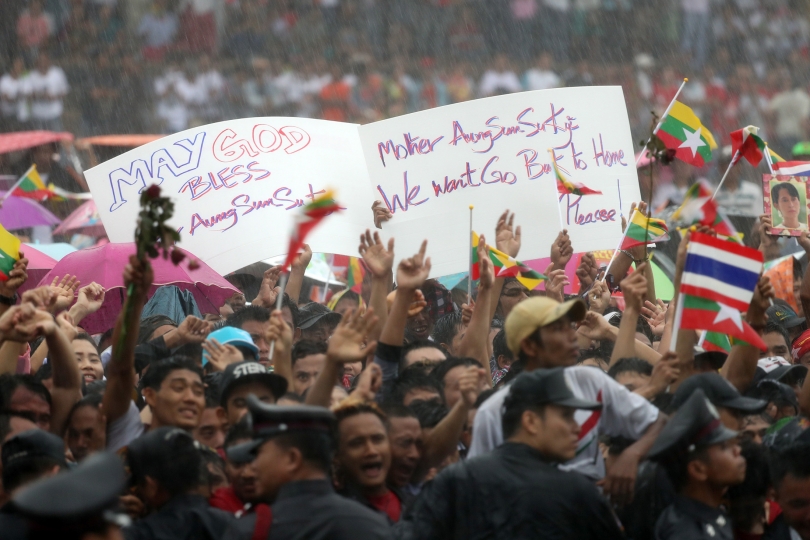Rousing welcome for ‘Amay Suu’

Migrant Myanmar workers in Mahachai petition visiting minister to improve their working conditions.
MYANMAR State Counsellor Aung San Suu Kyi yesterday spent the first of her three-day visit to Thailand visiting migrant workers, who gave her a thunderous welcome as well as complaints and demands to improve their living and working conditions in the Kingdom.
Speaking to some of the workers, Suu Kyi said, “Myanmar people are like guests in Thailand, so we should speak to the hosts honestly. It’s normal that problems will occur, so we should cooperate to successfully solve them together.”
Thousands of workers stood in heavy rain to give her motorcade a warm welcome as it headed to and from the little Myanmar town in Samut Sakhon’s Mahachai sub-district.
The workers had come from many places – from different parts of Bangkok to provinces in the North – to wait at Talad Thalay Thai from the break of dawn so they could catch sight of “Amay Suu” or “mother Suu”. The Myanmar leader arrived at 4.30pm and spent about an hour with them.
Nearly a thousand security officials were stationed at the seafood market to provide security for the Nobel laureate. The atmosphere yesterday was formal, far more so than in 2012, when she visited Thailand as a democracy icon instead of as an official representative of the Myanmar government.
Things did get a bit chaotic, when many of the workers fought to gain access to the meeting hall to speak to their leader. Suu Kyi also said she was disappointed that she could not meet more of her countrymen.
Many workers had come armed with their active passports or temporary work permits, or “pink cards”, hoping that these documents would allow them to meet the state counsellor. However, they were disappointed when they were told that a fixed quota had been set for the number of people who could meet Suu Kyi.
Some officers later relented and allowed many of the workers to enter the market’s compound, though they still had no chance to enter the hall and speak to her.
The Thailand-based Myanmar Born Gurkha Youth Association had come all the way from Chiang Mai to file a petition on migrant workers’ rights, education opportunities, healthcare and protection from injuries in workplaces
“I just want to call on Mother Suu to develop Myanmar. I trust her. It would be great to live with my family again,” U Than, a member of the association who works for a logistics company, said. “I can’t go home right now because I have to stay here to make money.”
Aung Ko, 26, is another migrant worker who appears to be quite happy living in Thailand.
“I’ve worked at a shrimp factory for six years now and am okay with that. I get paid Bt12,000 a month, and though they don’t have overtime work for now, it is still a decent wage,” he said.
However, Aung Ko pointed out that his factory wanted Myanmar employees to stick with the pink cards instead of getting their passports renewed. “With the pink cards we are limited to staying with one employer, though we also don’t need to go to Myanmar to renew our passports,” he said.
Meanwhile, inside the meeting hall, Suu Kyi pledged to issue a certificate of identity to migrant workers in a bid to ensure their well-being in the Kingdom.
This certificate could be on par with the temporary passport that allows Myanmar workers to live in Thailand legally as well as lets them move about freely, she said.
Suu Kyi asked her accompanying Labour, Immigration and Population Minister Thein Swe to take steps to ease the passport issuing process so that Myanmar people will no longer need to deal with middlemen who may charge them exorbitant amounts. Thein Swe assured that two labour agreements, to be signed today with Thai Labour Minister General Sirichai Dithakul, will cover protection and welfare of Myanmar workers.
The Migrant Worker Rights Network yesterday issued a statement addressed to Suu Kyi to raise concerns about the well-being of migrant workers in Thailand and also offered some recommendations for the Thai government to adjust its policies.
One of the recommendations was for the authorities to ensure the rule of law, so corruption can be prevented and moves can be made to comply with basic human and labour rights as well as social-protection laws.
RELATED
